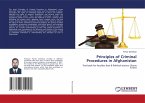This book reveals the oil that greases the wheels of one of Africa's best criminal justice systems. Principles of Namibian Criminal Law distils the major principles that help people answer this one big, life-defining question: Is the accused guilty? In 14 chapters, this book discusses principles that govern matters such as punishment, criminal liability, causation, unlawfulness, culpability, participation in crimes, and incomplete crimes. Largely inherited from South Africa, the principles of Namibian criminal law emanate mostly from common law and case law. Particularly, case law has been the channel through which lawyers in Namibia have, since Independence on 21 March 1990, molded their own criminal law doctrines. For that reason, this book heavily relies on the court cases that Namibian courts have forged since then. It showcases Namibia's South African heritage while giving pride of place to Namibia's homegrown jurisprudence - from the rules concerning corporate liability to the very definition of an 'accused'. Principles of Namibian Criminal Law will prove especially useful to law students who need to grasp the first principles of Namibian criminal law and to learn to think like lawyers, and to the seasoned practitioners (judges, attorneys, prosecutors, and police officers) who need to refresh their memories. The book should also serve the researchers and the comparatists looking for a window into how criminal justice actors think and resolve issues to make Namibia one of the continent's safest countries.
Hinweis: Dieser Artikel kann nur an eine deutsche Lieferadresse ausgeliefert werden.
Hinweis: Dieser Artikel kann nur an eine deutsche Lieferadresse ausgeliefert werden.








